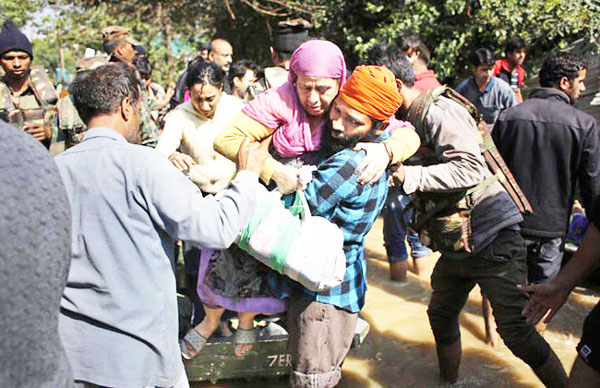Dr Abhishek Chowhan
The recent wrath of incessant rain in the region of Jammu and Kashmir has led to an unfathomable trail of death and destruction which will be etched in the mind of the common man for a long time. This natural calamity has bought this beautiful state to a virtual halt functionally, physically and psychologically, overwhelming our community’s ability to cope. Such situation can lead to mental health problems in the population both immediately and further as the time goes by. Immediate emotional reactions to a recent trauma may include fear, anxiety, depression, irritability, inability to sleep, and exhaustion. These distress responses may not necessarily correspond to any formal diagnosis and could be individual symptoms only. Occasionally they may take the form a full syndrome known as acute stress disorder. Interestingly there may not be any psychological problems at all during this early or acute phase as initially ensuring survival and safety are primary, and require the first priority. Others may be desperately searching for missing family members or trying to get their life on track. However as they slowly get adjusted to the loss of man or material, a very agonizing psychiatric disorder known as post traumatic stress disorder (PTSD) surfaces to haunt some of them.
PTSD, or Posttraumatic Stress Disorder, is a psychiatric disorder that can occur following the experience or witnessing of a life-threatening events such as military combat, natural disasters, terrorist incidents, serious accidents, or physical or sexual assault in adult or childhood. Most survivors of trauma return to normal given a little time. However, some people will have stress reactions that do not go away on their own, or may even get worse over time. These individuals may develop PTSD. People who suffer from PTSD often relive the experience through nightmares and flashbacks, have difficulty sleeping, and feel detached or estranged, and these symptoms can be severe enough and last long enough to significantly impair the person’s daily life.
Symptoms of PTSD most often begin within three months of the event. In some cases, however, they do not begin until years later. The severity and duration of the illness vary. Symptoms of PTSD often are grouped into three main categories, including:
* Reliving: People with PTSD repeatedly relive the ordeal through thoughts and memories of the trauma. These may include flashbacks, hallucinations, and nightmares. They also may feel great distress when certain things remind them of the trauma, such as the anniversary date of the event.
*Avoiding: The person may avoid people, places, thoughts, or situations that may remind him or her of the trauma. This can lead to feelings of detachment and isolation from family and friends, as well as a loss of interest in activities that the person once enjoyed.
* Increased arousal: These include excessive emotions; problems relating to others, including feeling or showing affection; difficulty falling or staying asleep; irritability; outbursts of anger; difficulty concentrating; and being “jumpy” or easily startled. The person may also suffer physical symptoms, such as increased blood pressure and heart rate, rapid breathing, muscle tension, nausea, and diarrhea.
PTSD is not diagnosed until at least one month has passed since the time a traumatic event has occurred. If symptoms of PTSD are present, the doctor will begin an evaluation by performing a complete medical history and physical exam. Although there are no lab tests to specifically diagnose PTSD, the doctor may use specially designed interview and assessment tools to evaluate a person for PTSD.
How is PTSD Treated?
The goal of PTSD treatment is to reduce the emotional and physical symptoms, to improve daily functioning, and to help the person better cope with the event that triggered the disorder. Treatment for PTSD may involve psychotherapy (a type of counseling), medication, or both.
Psychological First Aid: Support and compassion are critical in the immediate aftermath of a traumatic event. Some people will want to talk about the event frequently, while others will find it troubling to discuss the trauma. It is important to provide support to the individual, help the individual maintain connections with others and encourage him or her to seek assistance in dealing with trauma. Since many people living with PTSD go to a primary care doctor first, it’s important that symptoms be identified at this stage.
Medication: Doctors use antidepressant medications to treat PTSD — and to control the feelings of anxiety and its associated symptoms — including selective serotonin reuptake inhibitors (SSRIs) such as Paroxetine, Sertraline, Fluoxetine; and tricyclic antidepressants such as amitriptyline and Doxepin. Tranquilizers and sedatives such as alprazolam, clonazepam etc should be avoided as far as possible as they may delay the resolution of the core symptoms and lead to fixation of the memories. Certain blood pressure medicines are also sometimes used to control particular symptoms. For example prazosin may be used for nightmares, or propranolol may be used to help minimize the formation of traumatic memories.
Psychotherapy: Psychotherapy for PTSD involves helping the person learn skills to manage symptoms and develop ways of coping. Therapy also aims to teach the person and his or her family about the disorder, and help the person work through the fears associated with the traumatic event.
Prevention
The clichéd ‘prevention is better than cure’ do applies to PTSD as well. There are some ways in general which may allow individuals to remain in best of mental health after a traumatic event, especially any natural calamity. Firstly try to seek out support from wherever it’s available, be it family, friends or relief agencies. Secondly, find a support group for sharing the psychological burden. Thirdly, have a coping strategy or a way of getting through the bad event. E.g., in our society religion provides a good way to cope. And finally help others so that you feel good about your own actions in the face of danger.
( The author (Psychiatry) is a Consultant Psychiatrist, Govt Medical College, Jammu.)


